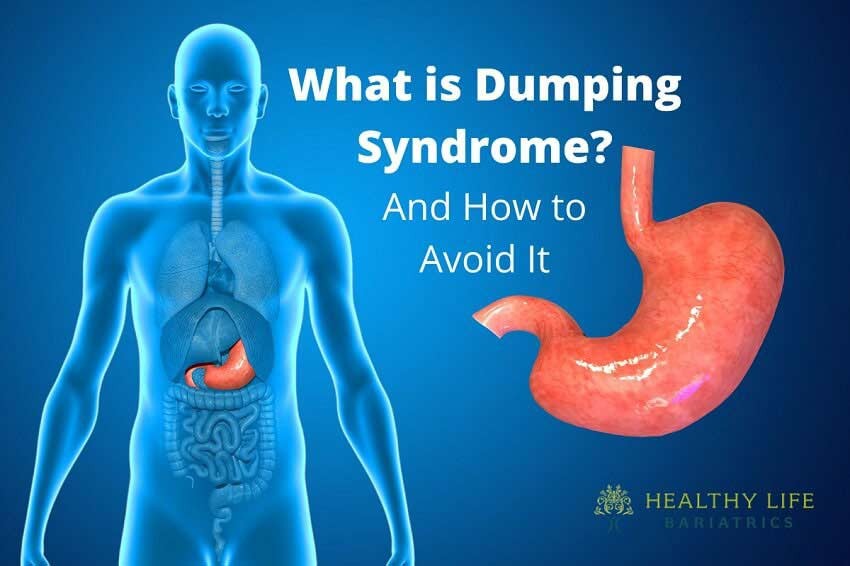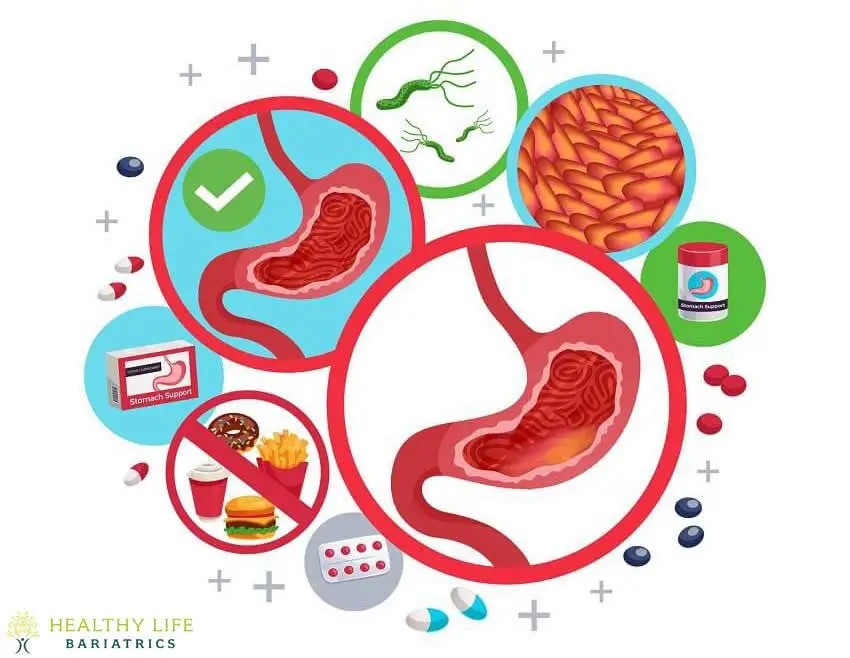
Have you ever heard about dumping syndrome?
Well, it’s interlinked with the procedure of weight loss. However, you might be surprised that dumping syndrome is a complication commonly associated with gastric bypass or some forms of bariatric surgery. However, you might be surprised that dumping syndrome is a complication commonly associated with some forms of bariatric surgery.
Bariatric surgery, or weight loss surgery, gives morbidly obese individuals the best chance to achieve a healthier weight and body. As a bariatric surgery patient, you should do all you can to avoid dumping syndrome, which can be extremely uncomfortable.
Please keep reading to learn more about this annoying ailment and how to avoid it while continuing your successful weight loss journey.
Dumping syndrome happens when the stomach contents empty too rapidly into the intestine. The medical condition is also referred to as rapid gastric emptying.
If you are unlucky enough to experience dumping syndrome, you might feel nauseous with abdominal cramping. These symptoms appear because the small intestine cannot absorb all the food emptied from the stomach. This means the food has not been digested properly.
You may be at risk for post-surgical digestive issues if you’ve undergone certain types of bariatric surgery. One culprit that tends to lead to this condition is gastric bypass surgery.

This condition occurs when large quantities of food slip from your stomach into your small intestine (duodenum). When the food moves, it tends to bring a lot of fluid. This fluid, a mixture of stomach acid and partially digested food and drinks, rushes into your small intestine. It causes symptoms like nausea and diarrhea.
The symptoms of early dumping usually manifest within 30 minutes after eating. Early dumping syndrome is the most common form of this bariatric surgery complication.
This condition happens when significant amounts of sugar (glucose) from your consumed foods and beverages slip quickly into the small intestine. A heap of sugar in your duodenum can cause your blood sugar to rise faster.
The pancreas responds to this by releasing the hormone insulin. Insulin causes your blood glucose levels to fall quickly, which can cause low blood sugar (hypoglycemia) and other symptoms, such as weakness and sweating.
Symptoms of late dumping appear within 1 to 3 hours after eating. Most people have either early or late syndrome, but it is also possible for one person to suffer from both forms of the condition.

In most cases, symptoms related to rapid gastric emptying improve over time. Nearly 75% of patients who undergo gastric bypass surgery experience digestive discomfort after the procedure, though most find that these issues resolve within 12 to 18 months.
To understand why dumping syndrome occurs, you should be familiar with the functions of normal digestion. When you digest food, the stomach empties its contents into the duodenum, the upper portion of the small intestine.
The food is emptied in a controlled manner, where oversized food particles are filtered out. For some bariatric patients, the changes made during surgery result in digestive system dysfunction. One function of bariatric surgeries, like gastric bypass surgery, is to make your stomach smaller.
With a smaller stomach, you may lose the regulatory function of the pylorus—the muscle that acts like a gate between the stomach and small intestine. When this mechanism is bypassed or impaired, larger food particles can enter the duodenum too quickly, triggering unpleasant digestive reactions.
The symptoms you experience with this condition can vary. Early syndrome makes patients experience bloating, weakness, dizziness, cold sweats, vomiting, diarrhea, abdominal cramping, and nausea.
Late dumping syndrome can deliver annoying symptoms like cold sweats, dizziness, rapid heartbeat, irregular heartbeat, weakness, and low blood sugar (hypoglycemia).

A doctor will begin evaluating your condition by assessing your specific symptoms and the type of bariatric surgery you underwent. A series of tests can help confirm whether you’re experiencing rapid gastric emptying or another post-surgical digestive issue.
This assessment measures how your stomach empties in the hours following a meal. Before you take the test, you’ll eat a meal containing a trace amount of radioactive material.
A special scanner your doctor uses can then identify the food in your stomach and its movement through your gastrointestinal tract. Gastric emptying tests can be conducted at a radiology center or local hospital.
This test employs the use of an endoscope, which is a flexible tube-shaped camera with a light on the end. Your doctor uses the scope to peer into the internal workings of your digestive system: your esophagus, stomach, and small intestine (duodenum).
The results of this test can also help your doctor identify additional medical problems that could be leading to your symptoms, such as an ulcer or stomach lining inflammation.
With this assessment, your doctor will draw a blood sample after you have fasted for at least eight hours. After one blood draw, you will drink a glucose solution. More blood samples are then taken every thirty minutes for up to three hours.
The test results will help your doctor determine how your body uses insulin to control your body’s blood glucose levels.
With this test, your doctor will tell you to remain seated or stand in front of an X-ray machine. You’ll then drink a barium solution, which your doctor can see on the X-ray. The barium makes some complications, like intestinal blockages, more visible on X-rayUsing this test, your doctor can observe how your body processes liquids to determine if you suffer from dumping syndrome.
You are more likely to experience dumping syndrome when you undergo bariatric surgery that removes or bypasses major portions of your stomach. Gastric bypass surgery is one example.
You can also experience this complication of bariatric surgery if you have some medical conditions, such as functional dyspepsia.
Functional dyspepsia causes the upper part of your digestive tract, including your stomach and esophagus, to push food forward consistently. Some types of nerve damage caused by esophageal surgery can also affect how well your stomach retains and passes food to the small intestine.

You can alleviate your symptoms by making a few lifestyle changes. For example, switch to five or six smaller meals instead of three substantial meals throughout the day. Avoid soda, baked goods, and sugary foods like chocolate bars.
Eat protein-rich foods like fish, chicken, tofu, and peanut butter.
Try to get more fiber in your diet. You can switch from simple carbohydrates like pasta and white bread to whole grains like whole-wheat toast and oatmeal. Fiber supplements can also help. Eating lots of fiber helps sugar and carbohydrates absorb more slowly into the intestines.
When drinking fluids, wait at least 30 minutes before and after meals.
While you eat, do your best to chew your food slowly and completely before you swallow, which helps with digestion. You can also try lying down after meals and adding thickening agents to your foods.
Finally, your doctor may recommend taking a nutritional supplement or a prescription medication. One of them is octreotide (brand name Sandostatin), a drug that alters the operation of your digestive tract.
When you take this drug, the food in your stomach will slowly empty into the duodenum. The drug also blocks the pancreas from releasing insulin. Some side effects of the drug include nausea, pain at the injection site, foul-smelling stool, and changes in blood sugar levels.
If you have undergone bariatric surgery and are experiencing dumping syndrome, call and let your doctor know if your symptoms fail to improve or worsen. In severe cases, a follow-up surgery may be required to repair the pylorus, which can help alleviate dumping syndrome symptoms.
If you’re dealing with uncomfortable digestive symptoms after bariatric surgery or gastric bypass, know that you’re not alone, and help is available. Common symptoms of dumping syndrome include nausea, abdominal cramping, diarrhea, weakness, and even rapid heart rate, especially after eating high-sugar meals. Fortunately, there are proven strategies to reduce symptoms and improve quality of life, including dumping syndrome diet adjustments, managing early dumping syndrome, and using medications or therapies when necessary.
At Healthy Life Bariatrics, we offer comprehensive treatment, helping patients understand dumping syndrome causes without surgery and how to manage or even prevent symptoms long-term. Wondering does dumping syndrome ever goes away? In many cases, it can be with proper care and follow-up.
Our board-certified bariatric surgeon, Dr. Babak Moeinolmolki, serves patients throughout Los Angeles, Encino, and Glendale, California. Whether you’re dealing with symptoms now or looking to prevent complications after weight loss surgery, we’re here to help.
📞 Call us today at (310) 861-4093 or fill out our contact form to schedule your consultation. We also welcome medical tourism patients from across the U.S. and beyond.
1. What Causes Dumping Syndrome After Gastric Sleeve or Bypass?
Dumping syndrome is usually triggered by consuming high-sugar or high-fat foods following weight loss surgery. It can also result from reduced stomach capacity and the absence of a pyloric valve, especially in gastric bypass patients. Hormonal and osmotic shifts in the gut are also involved.
2. How Does a Post-Bariatric Digestive Reaction Feel?
During a dumping syndrome episode, patients often experience sudden weakness, abdominal cramps, rapid heart rate, sweating, and the urge to use the bathroom. These symptoms can be uncomfortable but typically resolve on their own within a few hours.
3. How Can You Get Rid of Dumping Syndrome Fast?
To get rid of dumping syndrome fast, lie down after eating, sip electrolyte-rich fluids slowly, avoid sugary foods, and focus on eating smaller, protein-rich meals. Long-term management may include dietary counseling and, in rare cases, medications or surgery.